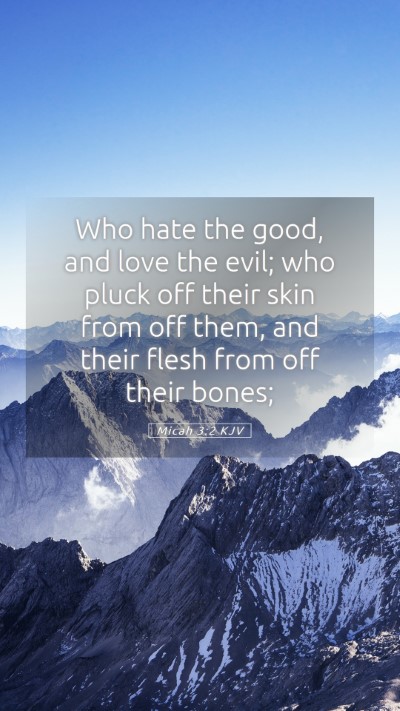Old Testament
Genesis Exodus Leviticus Numbers Deuteronomy Joshua Judges Ruth 1 Samuel 2 Samuel 1 Kings 2 Kings 1 Chronicles 2 Chronicles Ezra Nehemiah Esther Job Psalms Proverbs Ecclesiastes Song of Solomon Isaiah Jeremiah Lamentations Ezekiel Daniel Hosea Joel Amos Obadiah Jonah Micah Nahum Habakkuk Zephaniah Haggai Zechariah MalachiMicah 3:2 Meaning
What is the meaning of Micah 3:2?
Who hate the good, and love the evil; who pluck off their skin from off them, and their flesh from off their bones;
Micah 3:2 Bible Verse Meaning
Understanding Micah 3:2 - Commentary and Insights
The verse Micah 3:2 states:
"Who hate the good, and love the evil; who pluck off their skin from off them, and their flesh from off their bones;"
This verse serves as a powerful condemnation of corrupt leaders and false prophets in Israel. Below, we will explore the meaning of this verse through the lens of various public domain commentaries, providing a comprehensive analysis.
Bible Verse Meanings
Micah 3:2 expresses a stark reality about the moral decay observed in those who were supposed to lead and protect the people. The following insights summarize key interpretations:
Matthew Henry's Commentary
Matthew Henry highlights that the leaders in question are not merely neglectful but are actively engaging in malevolence. These rulers love evil and have forsaken righteousness:
- Hatred for Goodness: They show animosity towards what is good, indicating a complete moral reversal.
- Love for Evil: Their affection lies towards injustices, highlighting a perverse nature.
- Metaphorical Language: The reference to plucking skin suggests a thorough and brutal exploitation of their followers.
Albert Barnes' Commentary
Albert Barnes elaborates upon the implications for society:
- Judicial Corruption: The verse underscores the serious issue of moral and judicial corruption, where rulers don’t just ignore justice but actively pervert it.
- Call to Accountability: Barnes points out that these leaders are accountable for leading their people astray and the inevitable consequences of such actions.
- Symbolic Imagery: The vivid imagery serves to shock the audience into recognition of the severity of their moral failings.
Adam Clarke's Commentary
Adam Clarke places emphasis on the social implications of this exploitation:
- Impact on Society: The destructive behavior of these rulers impacts the societal structure adversely, leading to suffering among the innocent.
- Spiritual Consequences: Spiritual corruption follows, illustrating a disconnect between the leaders and God's righteousness.
- Urgent Warning: Clarke illustrates how this verse serves as a warning against the desires and practices that lead people away from God.
Bible Verse Interpretations
Micah 3:2 can be understood as a crucial indictment against leaders who misuse their power:
- It reflects on the nature of evil and how it manifests in society.
- The verse calls believers to seek out righteousness and to oppose corruption.
- It also stands as a prophetic warning about the consequences of failing to uphold justice.
Application of Micah 3:2 Today
The relevance of Micah 3:2 remains profound in contemporary society:
- Encourages individuals in positions of authority to act justly and with integrity.
- Calls on communities to reject and challenge corrupt practices.
- Offers a lens through which to examine our own moral choices and societal values.
Bible Cross References
For a more in-depth understanding of the themes in Micah 3:2, consider the following cross-references:
- Isaiah 10:1-3: Woe to those who enact unjust laws and oppressive measures.
- Ezekiel 22:27: Leaders who are like wolves, tearing at prey.
- Amos 5:12: The Lord's condemnation of those who oppress the righteous.
Conclusion
Micah 3:2 serves as an urgent reminder of the necessity for justice and integrity in leadership. By examining this verse through various commentaries, we gain valuable insights not only into the scripture itself but also into its applications for our lives today.


